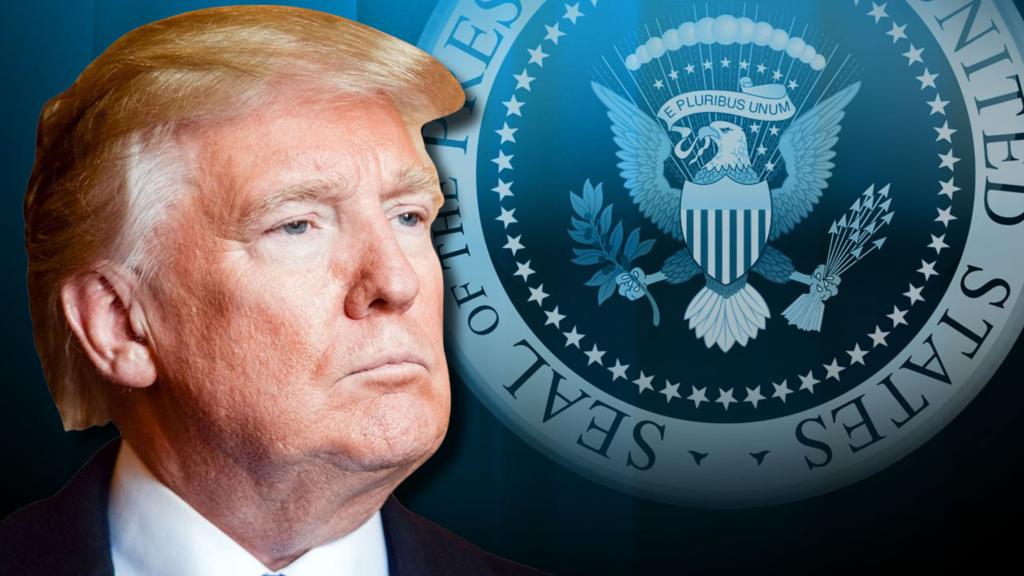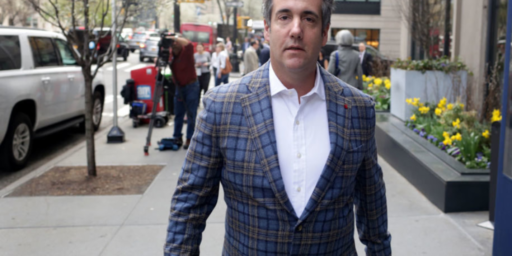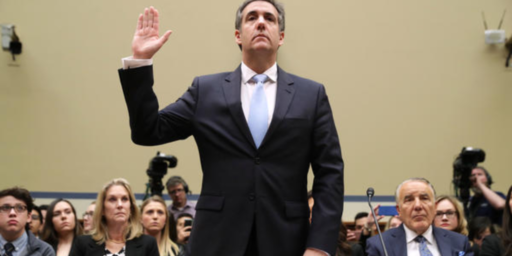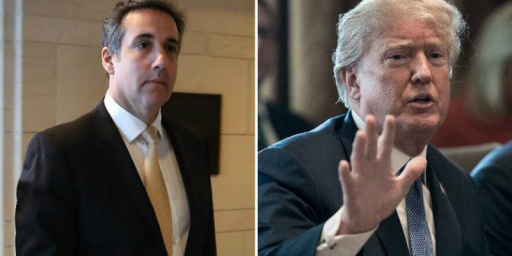Did Trump Really Want to Be President? Who Cares?
A new report raises an old question that's now irrelevant.

Many of us argued during the 2016 campaign and throughout the transition period that Donald Trump gave every appearance of a man who did not expect to win the election. Tomorrow will mark the second anniversary of his inauguration, rendering the question rather moot. But Frank Bruni nonetheless resuscitates it in light of yesterday’s report that Trump instructed Michael Cohen to lie to Congress about his dealings with Russia.
Donald Trump hungered for applause — the more frequent and louder, the better. He found that campaign rallies were a source of it like none that he had ever savored.
He thrilled to the appearance of his name not just in gold letters on tall buildings but also in newspaper headlines and on television screens. A presidential bid delivered those goods, too.
And he wanted ratings. Always, he wanted ratings. “The Apprentice” was a bygone badge. It was time for a bigger, brasher showcase. Running for president offered precisely that.
That was always the theory. What’s new now?
Regardless of the report’s veracity, we already know that Cohen pursued the Moscow project through June 2016 but falsely told lawmakers that he’d wrapped up that work the previous January: Last November he pleaded guilty to lying under oath.
We also know that Trump didn’t want his candidacy to foil lucrative deals and dilute his wealth. He publicly defended the fact that the Moscow project didn’t end when his campaign began, telling reporters, “There was a good chance that I wouldn’t have won, in which case I would have gotten back into the business, and why should I lose lots of opportunities?” Sacrifice isn’t his strong suit.
He had neither the requisite knowledge nor experience to serve as president. Now we know he wasn’t prepared psychologically, either. His campaign wasn’t a rehearsal for civic leadership. It was a brand-burnishing interregnum, a time-limited adventure in egomania.
“Donald Trump never thought he was going to be president,” the Trump biographer Timothy O’Brien, who wrote “TrumpNation: The Art of Being the Donald,” told me. “He began this thing as a marketing venture, and I don’t think the people around him thought he was going to win, either. They all jointly saw this thing as a big food fest.”
Paul Manafort would cycle back into commercial viability and political relevance. Jared Kushner would find a financial savior for 666 Fifth Avenue, his family’s towering albatross. Ivanka Trump would add weight to her cottony image. And her father, well, he’d be exponentially more famous, and there’s never fame enough.
“It had nothing to do with public policy,” O’Brien said. “It had everything to do with short-term opportunism.”
Major books about Trump’s campaign and election explore variations of the theme that victory surprised Trump and his enablers and caught them flat-footed. Michael Lewis’s most recent best seller, “The Fifth Risk,” begins with a damning account of the Trump team’s failure to carry out a coherent transition and fill key jobs in government.
In “Fire and Fury,” Michael Wolff writes that “Trump refused to spend any time considering, however hypothetically, transition matters, saying it was ‘bad luck’ — but really meaning it was a waste of time.”
“He wasn’t going to win,” Wolff continues. “Or losing was winning. Trump would be the most famous man in the world — a martyr to crooked Hillary Clinton.”
“Losing would work out for everybody,” he adds.
Michael D’Antonio, the author of “The Truth About Trump,” told me: “His past is not a past someone brings into the presidency, and he’s not so stupid that he wouldn’t have understood that. And I think he naturally feared the kind of examination that he’s undergone since the election.”
But because he wasn’t going to win, it wouldn’t matter that he’d paid off women with whom he’d had affairs, that he’d dispatched Cohen on so many unsavory errands, that he’d surrounded himself with such shady characters, that he refused to release his tax returns, that he forged ahead with the Trump International Hotel in Washington, that he vulgarly insulted the very lawmakers a president would need to collaborate with and that he surrendered any claim to moral authority by trafficking in racism and xenophobia. There would be no consequences because there would be no crown.
“This was a publicity gambit,” D’Antonio said. “It’s almost as if he believed that his candidacy was a joke, so under that circumstance, rigging polls and shouting about locking her up and issuing these racially charged lies about immigrants was O.K., because he wasn’t going to be president anyway. What he was doing was trying out ideas for his persona.”
Through that lens, this presidency and its shortcomings make complete sense. Trump couldn’t assemble and manage a top-notch cabinet because he’d never readied himself for that task. He couldn’t let go of any of the engines of his wealth because he’d never prioritized public service above it. He couldn’t say what the country needed him to after the violence in Charlottesville, Va., because he had no interest in the role of statesman and had never intended to play it. Rare is the person who finds a whole new skill set at his stage of the game, and rarer still is the person who finds a whole new set of principles.
Having long believed that the campaign was indeed a publicity stunt, the above is persuasive because it’s reinforcing. But, frankly, little of it is new information. At most, it’s more of the same.
Certainly, there are alternative explanations. Maybe he didn’t think he could win and was taken by surprise. But he’s a narcissist. It’s quite possible that he believed he could win despite the odds. Yes, he continued his business dealings during the campaign to hedge his bets in case he lost. But just maybe he figured he could continue them while in office and leverage the Presidency and all its trappings to bolster his personal fortune. Indeed, he’s continued to do so in spite of repeated complaints that he was in violation of the Emoluments Clause, federal ethics regulations, and the norms of American civic life.
More importantly, it’s not obvious why it matters anymore whether he intended to become President. He could, after all, have found an excuse to bow out before the inauguration. He could easily have claimed that he had no idea that taking the oath of office would require him to shutter Trump, Inc. and deprive his children of their legacy. He could have discovered a health issue that required him to step aside for the good of the country. Alternatively, he could have thrown his shoulder into it and attempted to govern in the best interests of the Nation. He did none of those things.
He took an oath to “faithfully execute the Office of President of the United States” and “to the best of [his] Ability, preserve, protect and defend the Constitution of the United States.” While one can question the extent of his ability, there is little evidence of his fidelity or interest in carrying out that pledge.






I agree that Trump the individual (or Individual), and his personal motivations, aren’t really important or relevant. On the other hand, I think Trump as the exemplar of a type is important for understanding how our governance processes are broken. “Con man runs for office and wins” is the plot of a dated comedy film; it shouldn’t be possible in real life. There are important lessons to be learned about where the sanity checks failed, and how to keep that from happening in the future — and I don’t think we’re learning them.
I don’t think Trump expected or wanted to win, but once he did, the I’ll show them who’s boss component–a very strong one–took over. I’ve said before that it’s vitally important to understanding Trump that you know that, first and foremost, he’s a failed social climber. He’s been desperate all his life to be part of the Manhattan social and financial elite, and enraged that they rejected him.
Now he’s the most important man in the world–and, by God, he’s going to rub your face in it.
It doesn’t matter legally. It makes no difference to what he does now. But it helps in putting the puzzle pieces together to understand what happened. Motivation is often a part of a case. It, for instance, makes sense of his pursuing Trump Tower Moscow well into the campaign.
Trump is quite like his voters, who are also filled with jealousy and resentment towards those more successful than themselves. Fortunately he’s every bit as incompetent as his supporters. This is the limitation of Trumpism, it’s a revolt of the stupid. Real leadership requires a degree of intelligence and character that Trump lacks.
Seeing a fellow cretin elevated to high office has been very exciting for the culties, but of course it’s not helping them in the slightest, quite the contrary. But there you see the advantage of creating a Cult of Cretins: they’re too dumb to realize they’re being fleeced.
@Michael Reynolds: The friend of mine who has gone down the Trumpist/alt-right rabbit hole seems to have (unfortunately) fallen into this trap. The inability to stand back and admit that one’s own activities or decisions were a) stupid b) created the very situation that one is now railing about. It’s one thing to do less-than-optimal decisions because you’re suddenly confronted with an emergency and your only two possible decisions are between Bad and Worse. It’s another thing when everything in your life turns out to be “an emergency” because of your decisions in another area and their trickle-down effects. (E. g. don’t complain to me about not having money when you’re the one who decided to pay money you couldn’t afford on an expensive gift for your kid.)
@grumpy realist:
One of my kids has moved in with her boyfriend. We subsidize her by paying their rent, health insurance and car. They both have jobs earning $15 an hour which is not great, but even in Marin it’s plenty when your rent, insurance and car are covered. And yet, she’s eternally broke, which will happen when you spend a week’s pay on a tattoo. But try telling a 19 year-old that her problems are entirely a result of her own choices.
No one is ever responsible, it’s always someone or something else. It can’t be that deciding to stay in Cowpaddy, Kansas decades after the last job left was a stupid move. No, the problem is someone should bring a factory to Cowpaddy. A factory with high-paying jobs you wouldn’t be qualified for anyway, because you chose to dismiss education or training.
This is why contra much reasonable-sounding opinion, I don’t think we should do anything at all to pander to those voters. They’ve consigned themselves to the dustbin of history and anything we do to help will be judged insufficient because what these voters want is a unicorn and no one can give them one. There is no reaching people who are living in a fantasy.
@Michael Reynolds:
Con men wouldn’t survive if there weren’t self-replicating battalions of people willing to be fleeced.
@Michael Reynolds: Here’s a comment over from Eureferendum:
If I ever run for POTUS, it’s going to be on the platform that “Stupidity should hurt”.
@Michael Reynolds:
This is tangential to the discussion but since you brought it up…
I generally agree with you, although I’m relieved that you provide proof that there is someone who thinks like me that is even more curmudgeonly than I. But I want to push back on the point you made above. When you grow up in a low paid environment and have never left it, picking up an moving to another location is a risky move. It may be the smartest move, but that doesn’t mean it is without danger. Landing in a new place never having taken a bus, opened a bank account, rented an apartment, dealt with people you didn’t know, etc, etc is a big jump and it takes a lot of courage. Yes, the long term outlook is better, but say that you scrape enough money together for a bus ticket and $500 extra. What do you do the day you arrive? Where do you sleep? What do you eat when the money goes? Say you went there because there was someone hiring but you don’t get a job? Or you get one, but you get sick, miss two days of work during the probationary period and get fired.
Look, you and I would probably make it all work somehow, because we know things, lots of things. We know how stuff works and have a pretty good idea of who’s scamming and who’s not. We sound educated and can act polished when necessary so we can talk our way into a bunch of things. And your kids and mine, while knowing less, could probably get by. too. But for a lot of rural or inner city young adults, there is a huge chasm between the day you arrive in a new place and the day you have certainty that you aren’t going to end up holding a cardboard sign at an intersection.
@MarkedMan:
I am only borderline competent at adulting. I’m pretty awesome at distributed systems, and it gives me enough money that I can be borderline competent at adulting, but I recognize my weaknesses. Moving somewhere without a support network, without a job lined up and without a pretty big emergency fund is something that I would screw up, badly.
I have the money to buffer my screw ups. These people don’t.
@MarkedMan: I saw a news story a week ago that said that moving to more prosperous areas now has no net benefit for low-skilled workers.
I spent my entire $5,000 life savings one time moving across country for a job that I was told I had, only to be jerked around for several months and then told the job no longer existed. I had to borrow money from people to move back across country to a place where I at least had a place to stay. The whole taking initiative, showing gumption, picking up and moving to the big city and making it all work by pulling yourself up by your bootstraps… It’s less possible now than it’s ever been in America.
@Michael Reynolds:
With the structure of the Senate, if we blow off these people, we hurt ourselves.
Like it or not, land votes in this country — or at least magnifies the weight of the votes of the bitter clingers still hanging on. It’s an antiquated system that doesn’t fit well with a modern economy based on large cities, but it is nearly impossible to change.
The Democrats need a real plan, or at least a convincing message (should we go the con man route) for Cowpaddy, Kansas.
We can’t depend on big cities to dominate the Senate votes in all these states. John Tester is out there in Montana, and I’m not even sure they have cities in Montana — I have no idea how the man gets elected, other than barely.
@MarkedMan: Plus a lot of the “benefits” one has in rural areas is a web of people one is strongly connected to that you can depend upon to provide a helping hand if something goes wrong. Moving to a different state/city/country means ripping yourself out of the web and just hoping that nothing goes wrong.
On the other hand, a lot of the dwindling of the rural population has been because of the ever-increasing reach of Big Ag. Farms have to get bigger and bigger just to survive, which means not only that the population dwindles, but the support population catering to the needs of rural inhabitants (doctors, lawyers, etc.) also dwindles because THEY can’t make a living either. Hence why I call Kansas “a green desert.” And just wait until drones and automatic machinery gets a bit down the pipeline–the rural population will just continue to dwindle.
We really need to put the kibosh on Big Ag and encourage small farming again, but that will require higher food prices to make this financially viable, so I doubt it will ever happen!
(A good friend of mine, also from MIT, comes from a small farm background and we’ve talked about this a lot.)
@DrDaveT: The failure here is not in the process; it’s with the voters. The lesson to learn is that any government reflects the character of the citizens of that country. That’s why we aren’t learning the lessons–“We have met the enemy, and he is us.”
@Teve: I don’t know who said it, but the adage “It’s pretty hard to pull yourself up by your boot straps when you don’t even have boots” rings true. It’s easy to say “move out of Cowpatty” but harder than it looks a lot of the time.
@Gustopher: The three largest cities in Montana are all over 50,000, so in a marginal sense, yes, Montana has “cities.” To set that in perspective, the entire population of Montana is almost exactly one third the population of Metropolitan Seattle. With Seattle being the 13 largest city in the US, no, Montana has no “cities” in the sense that most people understand the word “city.”
@grumpy realist: I don’t know whether creating artificially small farms just to employ more people is the answer, but something needs to be done.
I was just reading about the Insulin manufacturers, and how they have been making tiny changes to the formulation to keep it off generic, and coordinating the prices.
Put a non-profit drug factory outside Topeka, to pay good wages and produce generic drugs. Drug prices go down (good), some jobs in a small city are created (good), those jobs support more jobs, near Cowpatty. Not sure we can get the trained workers needed in Topeka, but maybe we could train them up.
And, it is easier for someone to risk moving from Cowpatty to Topeka than from Cowpatty to Seattle.
We have lots of problems in this country. We have lots of mostly rural states. We can match them up.
And yet we’re told that this is the land of opportunity, that if you work hard and play by the rules you can make it…the first step in fixing all of this is admitting that is a lie and the game is rigged…
@Gustopher: All well and good, but remember that job training programs in the US are conceived (and I speak as someone who worked both with and in them as a teacher and job trainer in 2-year colleges) to make it seem as though the government is taking action to solve employment problems and to create skills gluts that can be used to drive down wages.
Case in point: In the late 90s, the State of Washington created a program to allow “placebound” and underemployed adults to train to become teachers without having to leave their towns of residence to attend school (as I had to do 10 or 15 years earlier). The program was said to have been started to address a pending teacher shortage. At the end of two years, the program was abandoned having placed no teachers from this program in teaching posts anywhere in Washington State. All of the graduates from these programs who attained full-time employment did so out of state. In the meantime, a school district in the area of the college at which I was teaching announced that they were able over the summer to hire enough substitute teachers to replace 80% of the teachers in the district on any given day.
I’m not opposed to job training programs, but I can see why the good residents of Cowpatty are chary about them.
@Just nutha ignint cracker: Oh I forgot to add, the projected teacher shortage did eventually come–in 2015 just as I had returned from 8 years teaching in Korea. The human resources officer from a local district explained to the local newspaper that the district was finding it necessary to hire teachers straight out of university instead of ones that have 10 or 15 years experience. (This from an HR person in a town of 32,000.) Even the shortage was merely a shortage of “preferred” candidates.
@grumpy realist: Having spent 30-some wonderful years living in a small town in southern Appalachia I think that the tenacity of small town/rural living is kind of existential. Example: My very good friend can take you around town and show you the homes of his 3d grade classmates, his cousins and the spots on which his entire life has been lived. If you take someone with that experience and move them to Atlanta or even Knoxville, they have to answer the question ‘who am I’ without any of the relationships or memory-jogs that they have counted on for their whole lives. They would become (I think I use the term rather precisely) ‘alienated’.
They’d rather be broke than face that kind of poverty. Doesn’t mean they don’t resent the ‘elites’ they see or hear about. But they have good reasons for making the choices that they did.
To get back to the question of the Original: I am neutral/agnostic on the question of ‘what was Trump thinking about his chance of winning?’ I’m doubtful that most human beings ‘think’ in that way. But if Mr Trump was running without expecting to win it would be an exceptional event in the history of American elections. I remember after his monumental loss to Mr Nixon someone asked Sen McGovern whether his campaign knew how futile all his efforts were. He replied that No, he sat down the night of the actual voting expecting to win.
@Just nutha ignint cracker: so what went wrong exactly? Did the program graduates choose jobs out of state because they wanted to see new places, or because their local districts weren’t hiring when they finished the program?